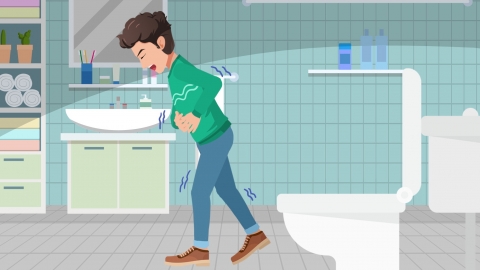Why is there no symptom of gastrointestinal bleeding?
Generally, the absence of symptoms in gastrointestinal bleeding may be due to minimal blood loss that does not cause discomfort, a slow bleeding rate allowing the body to gradually adapt, chronic non-atrophic gastritis, early-stage gastric ulcer, or the compensated stage of cirrhosis. It is recommended to seek timely medical attention, identify the underlying cause, and receive appropriate treatment under a doctor's guidance. Detailed analysis is as follows:

1. Minimal Blood Loss: When only a tiny amount of bleeding occurs in the stomach, the blood passes out with digested food without causing symptoms such as abdominal pain or black stools. This is commonly seen in mild mucosal injury. In daily life, avoid consuming spicy or excessively hot foods to reduce irritation to the gastric mucosa. Maintain regular eating habits and avoid overeating to reduce the risk of worsening bleeding.
2. Slow Bleeding Rate: Bleeding persists but occurs at an extremely slow rate, allowing the body's compensatory mechanisms to adapt gradually without causing noticeable discomfort. It may only be detected during a medical examination. Regular gastroscopy is recommended to monitor the bleeding condition. Additionally, quit smoking and alcohol consumption, and avoid taking medications such as aspirin enteric-coated tablets that may damage the gastric mucosa.
3. Chronic Non-Atrophic Gastritis: Mild inflammation exists in the gastric mucosa, which may cause minor bleeding due to inflammatory irritation, often without obvious symptoms. Patients may take medications such as hydrotalcite chewable tablets, omeprazole enteric-coated capsules, and rebamipide tablets as directed by a physician to protect the gastric mucosa, suppress gastric acid secretion, and improve the inflammatory condition.
4. Early-Stage Gastric Ulcer: The ulcer lesion is shallow and only causes minor bleeding without triggering noticeable symptoms such as abdominal pain or acid reflux. Patients should take medications such as rabeprazole sodium enteric-coated tablets, potassium citrate bismuth capsules, and amoxicillin capsules as directed by a physician to suppress gastric acid production and protect the ulcerated area.
5. Compensated Cirrhosis: In the early stages of cirrhosis, mild elevation of portal venous pressure leads to slight varicosity and bleeding of gastric fundal veins. Due to minimal bleeding and the body's compensatory mechanisms, no obvious symptoms are present. Patients may take medications such as polyene phosphatidylcholine capsules, silybin capsules, and spironolactone tablets as directed by a physician to protect liver function.
In daily life, maintain a bland and easily digestible diet, consuming more foods such as porridge and soft noodles, and avoid hard or coarse foods that may injure the gastric mucosa. Maintain regular sleep patterns, avoid excessive fatigue, and adopt a healthy lifestyle to reduce the likelihood of worsening gastrointestinal bleeding and promote gastric health.






